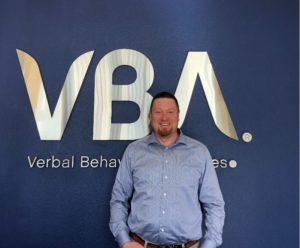Ever wonder what makes CEO Matt Howarth tick? Well here’s the inside story:
- What made you want to start this company?
I started this company after serving as the Applied Behavior Analysis Supervisor for San Diego Unified School District, and previously as a Program Specialist. I interfaced with a number of companies who provided Applied Behavior Analysis, and I thought we could do it better. I understood the needs of schools and the problems they were trying to solve. Clinically, I knew we could get better outcomes by using scientific procedures, which were often lacking those providing the services.
- Where do you see this company in 5 years?
VBA is working hard to open its own Non-Public School for children with severe problem behaviors. The plan is to assess the behavior, develop a plan, make sure that plan is effective, and then work to bring the students back to their home school districts by training the school staff to implement the plans we develop. I would like to see us have centers like this in several regions around Southern California, and possibly beyond. I also expect VBAs current programs to continue to grow, particularly in the Riverside area.
- Who motivates you to be a better person? My family, along with the institutions that I passed through as a child and young adult. I do know I’ve always wanted to give more than I took, and leave the world a better place.
- What do you look for when promoting within? I look for people who have a drive to make sure that our clients are getting the best possible services, and who are willing to put in the extra effort to make sure those services happen. I also look closely for individuals who are able to learn from their mistakes. This involves recognizing that you don’t know the answer to everything, and being open to feedback, not just saying you are, but actually adjusting your behavior. If you don’t recognize your mistakes learning is impeded. This is the essence of the scientific method with regard to applied behavior analysis. You have to adjust your behavior based on the responses of others and feedback from the environment.
- What advice would you have for yourself if you could go back 10 years in your career? Well, VBA has been around for about 8 years, and that was the best decision I ever made–to start the company. So I wouldn’t change much. Two years prior I was working on finishing my dissertation, which was an extremely valuable experience.
- What do you find most challenging about your role? Early on at VBA, I worked hard to try and get everyone to understand the big picture. About how decisions we make affect other parts of the organization. That there is always a give and take. What has been hard is that it isn’t always possible to convey that experience or information to others who aren’t dealing with those elements. Therefore, I have to focus more on setting up systems that get the best outcomes for people.
- What inspires you outside of the company? My children. They help me see the bigger picture, and no matter what happens during the day, they always cheer me up.
- How do you define success? Making significant changes in the lives of our clients. What our organization is capable of is incredible. One example, we have worked with an adult, about to graduate from the school system, who still wasn’t independently using the bathroom, was emitting self-injurious behaviors, and was unable to tell you what they want or need. After significant efforts from our teams in the field, all of these issues were fixed. For that individual, and those like him, this is a monumental change for their benefit, their families, and those who will be tasked with their care across their lifetime.
- If you could do anything in the world and money didn’t matter, what would it be? Get our standard of service to more children in the world, and improve on it.
- What three books would we find on your bookshelf at home? About Behaviorism by B.F. Skinner, Dune by Frank Herbert, and Civilization and Its Discontents by Sigmund Freud
- What energizes you most about this company? Being able to go into a school or home with a complex problem, effectively measure what is needed, give it to our teams, and then come back later and see the awesome work that they have done. That is powerful, and those involved know it.

